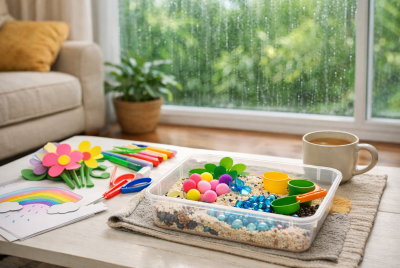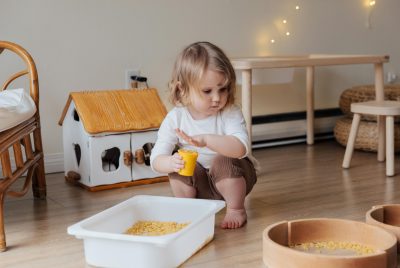Active Parent: A Guide to Raising Engaged and Energetic Children
We may earn a commission for purchases made using our links. Please see our disclosure to learn more.
Man, being a parent these days is like trying to solve a puzzle that keeps changing shape, right? Just when you think you’ve got the hang of it – BAM! – your kid hits you with something completely new. (My friend Sarah swears her 4-year-old invents new ways to surprise her every single day!)
So everyone’s talking about this “active parenting” thing. And no, it’s not just about showing up to every bake sale or school play (though props to those super-parents who somehow manage to do it all!). It’s way more than that – and honestly? Sometimes it can be exhausting. But here’s the thing: it’s also incredibly rewarding.
Think of it like this – you’re not just watching your kid’s life movie from the sidelines. You’re right there in it, being their co-star, director, and biggest fan all at once. (Okay, maybe sometimes more like their personal stunt coordinator when things get wild!)
Let’s dig into what this active parenting gig is really about, and how you can rock it without completely losing your mind. Trust me, there’s a sweet spot between “helicopter parent” and “totally hands-off” – and that’s exactly what we’re going to figure out together.
What Is an Active Parent?
Look, showing up to your kid’s games and recitals is awesome, but being an active parent goes way deeper than just warming those bleacher seats! It’s about really tuning in – you know, actually listening when they’re spilling about their day instead of just nodding while your mind wanders to your to-do list.
The trick is finding that sweet spot: being there enough that they feel supported, but not hovering like a helicopter. Think of yourself as their backup singer, not their micromanager. Be present and engaged, but give them enough space to figure some things out on their own. After all, watching them grow into their own person? That’s kind of the whole point!
(And between us? Sometimes letting them stumble a bit is the hardest – but most important – part of the job!)
Why Is Active Parenting Important?
Why is this important? You and your child develop a strong, trusting relationship through active parenting. It creates a sense of security and opens channels of communication. Your child will grow up feeling more comfortable, self-assured, and emotionally resilient when they know you’re really there. Who doesn’t want their child to experience that type of support, really?
Active vs. Passive Parenting: What’s the Difference?
Keep with me for a moment. Imagine that you are operating a vehicle. Being an active parent entails driving, navigating, and adapting to the path ahead. Conversely, passive parenting is similar to letting the car drive itself; you’re still involved, but you don’t have much influence. Parents that are actively involved help their children navigate the complexities of life. Parents who are passive? They are just a little… there.
How to Be an Active Parent in Daily Life
Active parenting doesn’t mean scheduling every single second of your child’s life. (We’re all way too busy for that, right?) It’s about being intentional in the moments you do have together. So, how do you sprinkle active parenting into your daily routine?
Morning Routines Matter
Mornings can be chaotic, but they’re also a great time to connect. Rather than rushing through the routine, try to take a moment to chat. Ask them about their day ahead, share your plans, and set a positive tone for both of you. Even if it’s just a quick “What’s something you’re excited about today?”—it makes a difference.
Playtime with Purpose
Playtime is more than just keeping your kid entertained. Whether it’s a game of catch, building Legos, or drawing together, use that time to connect. Ask questions, give praise, and sneak in some lessons on teamwork or problem-solving. (Bonus: It’s actually fun for you too—promise.)
Bedtime Stories Aren’t Just for Fun
Ah, bedtime. It’s more than just a wind-down ritual. Reading together isn’t only about fostering creativity or improving language skills—it’s also a prime bonding moment. After the story, take a few minutes to chat about their day. Ask what made them happy or if anything bothered them. It’s a small thing, but it’s a perfect opportunity for connection before they drift off to sleep.
Communication Is Key in Active Parenting
The bottom line is that communication is crucial. Additionally, listening is just as important as talking. Paying attention. Don’t use the clichéd “How was school?(because, let’s face it, “fine” is typically the response). Try asking something like, “What did you enjoy most about your day?or “Did anything noteworthy occur today?These open-ended inquiries demonstrate your genuine interest in your child and encourage a genuine dialogue.
Setting Boundaries with Love
Setting limits is important because kids require structure. Don’t worry, though; establishing rules does not make you a villain. Boundaries are like a house’s walls: they keep your child secure, but they also give them lots of space to explore and develop. Be receptive to debates and always provide the “why” behind the regulations. The goal is to guide rather than dictate.
The Power of Positive Reinforcement
Here’s a little secret—kids respond way better to positive reinforcement than constant criticism. Focus on the good stuff they’re doing instead of always pointing out what they did wrong. A simple, “I love how you shared your toys today!” can go a long way in building good habits.
Balancing Discipline with Empathy
Discipline isn’t about immediate punishment. Instead, take a moment to understand the why behind your child’s behaviour. Did they act out because they’re tired, hungry, or maybe overwhelmed? When you address the root cause, you’re more likely to fix the behaviour in the long run. Empathy, not anger, is the key.
Active Parenting for All Ages
Active parenting isn’t just a toddler thing—it’s a lifelong commitment. But, how you approach it changes as your child grows.
- In the Early Years: Get hands-on with learning. Play interactive games, read books, and introduce them to new experiences. You’re their world at this stage, so soak it all up.
- During School Years: Encourage their curiosity. Be there to help with homework, but let them figure things out on their own, too. Attend school events and celebrate their achievements, but don’t steal the spotlight.
- In the Teenage Years: Teens are tricky—they want independence, but they also still need your guidance. Be involved in their lives, ask about their friends, and support their hobbies, but give them space to make their own decisions.
Balancing Active Parenting and Self-Care
Let’s be real: being an active parent can sometimes feel like you’re always “on.” But here’s the thing—you can’t pour from an empty cup. Self-care is not selfish. In fact, it’s one of the best things you can do for your child. When you’re feeling good, you’ll be more patient, understanding, and present. So go ahead, take that break—you’ve earned it.
The Role of Technology in Active Parenting
We live in a tech-driven world, and that’s not going to change anytime soon. So, how do you make technology work for you instead of against you? Set boundaries for both yourself and your child. Use tech to bond by watching educational videos together or playing family-friendly games. Technology doesn’t have to be the enemy—it can be a tool for connection.
How to Stay Active in Your Child’s School Life
Being involved in your child’s education is a big part of active parenting, but it doesn’t mean you have to volunteer for every school event (unless that’s your thing, then go for it!). Focus on quality over quantity. Attend parent-teacher meetings, help with homework, and maintain open communication with their teachers. It shows your child that you care, without overloading yourself.
Why Active Parenting Is Not Helicopter Parenting
It’s easy to confuse active parenting with helicopter parenting, but they’re not the same. Helicopter parents hover, controlling every little thing their child does. Active parents, on the other hand, are guides—they provide support but allow their child to face challenges and learn from mistakes. It’s about guiding, not micromanaging.
Building Emotional Intelligence in Children
Active parents understand the importance of emotional development. Teach your child to identify, understand, and manage their emotions. For example, when your child is upset, you could say, “It looks like you’re feeling frustrated—do you want to talk about it?” Helping them label their feelings builds emotional intelligence and strengthens your bond.
Encouraging Independence Through Active Parenting
Active parenting isn’t about doing everything for your child. It’s about giving them the tools to do things on their own. Whether it’s learning to tie their shoes or solving a tough math problem, allow them the space to try, even if it’s messy. You’ll be there to support them, but they’ll grow more confident with each success (and mistake).
The Role of Patience in Active Parenting
Patience is everything in parenting (easier said than done, I know). Kids won’t always get things right on the first try, and that’s totally okay. Be patient with them as they learn and grow, and remind yourself that every challenge is an opportunity for both of you to grow.
How to Be an Active Parent in a Busy World
Life is busy. We’ve all got a million things going on, and sometimes it feels like there’s no time for anything. The key is to make the most of the small moments. Even if it’s just a quick bedtime story or a conversation at dinner, it counts. It’s not about how much time you spend, but how intentional that time is.
Active Parenting as a Partnership
If you’re co-parenting, being on the same page is crucial. Active parenting works best when both parents agree on the values they want to instil. Consistency in rules, communication, and support creates a stable, nurturing environment where your child can thrive.
Related Products to Support Active Parenting
Let’s be honest—parenting is hard, and there’s no shame in using tools to make it easier. Here are some products that can support your active parenting approach:
- Educational Toys and Games: Puzzles, building blocks, and interactive games can help with problem-solving and creativity. Plus, it gives you a chance to bond during playtime.
- Parenting Books and Resources: We can all use a little help sometimes. Parenting books on child development or emotional intelligence can give you new strategies for becoming an even better active parent.
- Activity Trackers for Kids: These can motivate kids to stay active and set goals. You can even participate in the challenges together—win-win!
- Family Planners and Organizers: Staying organized is half the battle. A family planner can help you keep track of schedules and activities so you can be more intentional with your time.
Overview of Active Parenting Programs
Active Parenting programs, such as Active Parenting Today and Active Parenting of Teens, have been evaluated through numerous studies. These programs aim to enhance parenting skills through structured education, focusing on effective communication, discipline strategies, and understanding child development.
- Improvement in Child Behavior:
- A national study involving 287 parents reported significant enhancements in children’s behavior after completing the Active Parenting programs. This was measured using two child behavior questionnaires with reliability ratings of .78 for children and .87 for teens.
- Parents noted a reduction in negative behaviors (e.g., aggression) and an increase in positive behaviors (e.g., empathy) among their children post-intervention.
- Parental Confidence and Skills:
- Participants exhibited increased confidence in their parenting abilities compared to a control group. Studies indicated that parents improved in communication skills and support roles after completing the program.
- The programs fostered a sense of self-efficacy among parents, enhancing their overall satisfaction and feelings of competence in parenting
Summary
The key components of active parenting are intentionality, engagement, and presence. It is more important to show up for your child in meaningful ways than it is to be flawless—who is? You strike a balance between independence and supervision, empathy and discipline, and freedom and bounds. The benefits? An emotionally knowledgeable, self-assured child who understands that they are loved and supported at every turn.
5 FAQs About Active Parenting
1. What’s the difference between active and passive parenting?
Active parenting is about being engaged and intentional, while passive parenting is more hands-off and reactive.
2. How can I be an active parent if I have a busy schedule?
It’s all about quality over quantity. Even small moments like a quick conversation or a bedtime story can make a big impact.
3. Is active parenting the same as helicopter parenting?
Nope. Active parenting supports and guides, while helicopter parenting controls and micromanages.
4. How does active parenting benefit my child?
Active parenting builds emotional intelligence, independence, and a strong parent-child bond, all of which help your child navigate life with confidence.
5. Can active parenting help with discipline?
Yes! Active parenting encourages positive reinforcement and empathetic discipline, helping children understand and correct their behaviour in a supportive environment.
By embracing active parenting, you’re not just raising a child—you’re nurturing a confident, capable human who’ll carry those lessons well into adulthood. So, ready to dive in?




